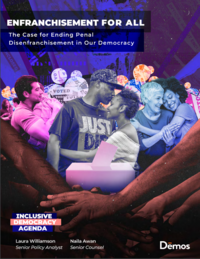Executive Summary
Our democracy is strongest when all people have a say in decisions affecting our lives and our communities. An important way we do that in a democracy is by voting. Yet today, we continue to deny this most fundamental right to millions of Americans. Despite important advancements in access to the franchise achieved by the tireless struggle of Black Americans and others who envision a more inclusive democracy, a large group of U.S. citizens remains locked out of the vote across almost the entire United States: people involved in the criminal legal system.
This stain on our democracy formally disenfranchises more than 5 million Americans with felony convictions, and makes voting impossible for many others who have not lost their voting rights but are unable to access a ballot. And because our criminal legal system disproportionately targets, arrests, sentences, and locks up people of color, this disenfranchisement scheme especially robs Black and brown Americans of their voting rights.
We have a solution: Enfranchisement For All. Through bold action at the federal, state, and local levels, we can abolish penal disenfranchisement in all its forms. These actions, detailed further in our latest report, include –
- Congress passing legislation abolishing the practice of felony disenfranchisement in all federal elections, including for those who are currently incarcerated.
- State lawmakers abolishing felony disenfranchisement in their states by overturning existing statutes that permit it and supporting amendments to their constitutions to strike the disenfranchising language.
- Local jail and election officials undergoing training on the voting rights of people detained in local jails, creating publicly-available plans for the accessibility of registration and voting in jails, and, where state law allows, creating polling places and/or allow for in-person absentee voting in local jails on Election Day.
- Congress, states, and localities alike immediately passing laws that dramatically reduce prison and jail populations, and which shorten or eliminate the period of pretrial and post-conviction incarceration.
Most importantly, lawmakers, elections officials, and personnel in the criminal legal system must partner with grassroots and community groups to ensure these policies are informed by incarcerated people, and so these communities are aware of their voting rights, can access information on elections and races, and have real opportunities to register and cast their ballots.
